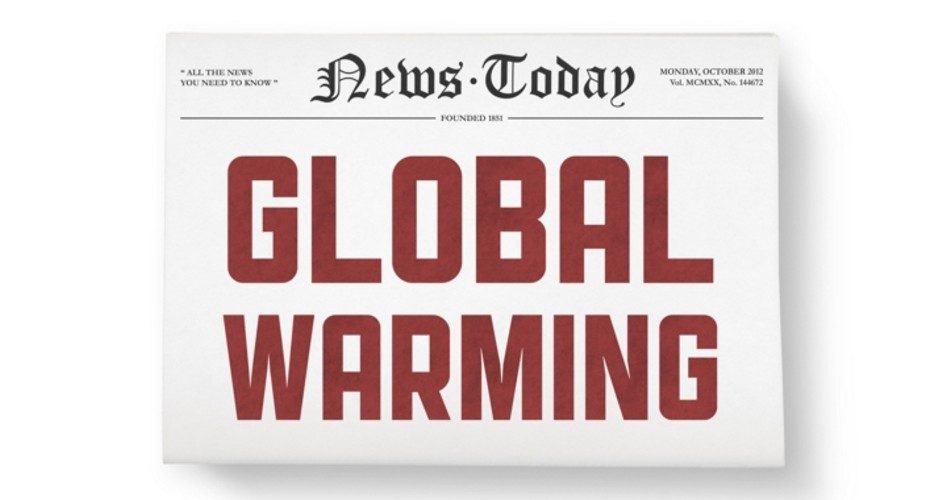
The cult of climate change is experiencing yet another identity crisis. Some in the movement believe that the term “climate change” is not frightening enough, and the movement needs a rebranding in order to properly rouse the world’s population to action against the fake calamity.
Back in the beginning of the 21st century, “global warming” was the term peddled to the public as the coming disaster that would necessitate a world government. When the world ceased warming, a new catch-all phrase — climate change — was coined to keep the world’s populace fearful than man-made carbon dioxide was destroying our atmosphere. Now, climate hysterics are worrying that neither term — global warming nor climate change — is enough to keep the public properly terrified.
“As a professional namer, I create names for companies, products and services,” wrote Aaron Hall in AdAge. “After the global climate strike this past September, I found myself thinking about the terms ‘climate change’ and ‘global warming.’ Are these scientific terms too neutral? Do they do enough to grab attention and inspire people to take action?”
Well, for one thing, the term “climate change” is a meaningless tautology. Since climate is a statistical average of weather conditions gathered over decades, change is implied. As for global warming, if the Earth isn’t, in fact, warming, as it wasn’t during the first part of this century, the use of the term is a misnomer. So, the climate hysteria movement seems to be struggling to find its identity.
Hall believes the terms “Global Meltdown” or “Global Melting” might be possibilities. “The names signal that ice caps are melting, but also create a more visceral image in the mind — that real feeling of ‘melting’ when it’s too hot outside. A meltdown is a disastrous event that draws from the ultimate terror of a nuclear meltdown, an apt metaphor for nuclear destruction.”
The brand-naming expert also favors the terms “climate collapse” and “climate chaos” as sufficiently terrifying.
It’s not only advertising gurus who believe the term “climate change” isn’t a strong enough term to rouse the public to action. In June, a group ofclimate NGOs, including Greenpeace, Al Gore’s Climate Reality Project, and the Sierra Club, wrote an angry diatribe to all of the major television networks, calling for them to begin calling climate change a crisis.
“There is an alarming disconnect between the scientific community’s dire warnings about the urgent, existential threat from climate change and how the American people perceive the issue,” the group Call it a Crisis wrote.
“We are urging you to call the dangerous overheating of our planet and the lack of action to stop it what it is — a crisis — and to cover it like one.”
Nothing says something is a true emergency like having to beg television networks for coverage about it. Nevertheless, the campaign seems to be slowly having an effect. If you listen to mainstream news coverage of climate change, more and more the term “climate crisis” is being peppered into the conversation by reporters and anchormen.
So, perhaps Hall is on to something. Maybe what the climate-change hysterics need is a rebranding to properly frighten the populace into giving up our meat, giving up our automobiles, and giving up our freedom in supplication to the goddess that is Planet Earth.
The ad-man really seems to like the term “Scorched Earth.”
“It’s time to take the gloves off and stop pretending,” Hall writes. “Sometimes a brand name needs to be hyperbolic to truly capture hearts and minds. If we don’t take massive action now, Earth will be uninhabitable — an irreversible barren wasteland. Plants and animals will die. Humans won’t be able to survive extreme weather like floods, droughts and fires. If we don’t change, we won’t even be able to spend time outside. ‘Scorched Earth’ paints the dirtiest picture of what’s to come and what we must avoid and is likely the edgiest brand name from our exploration.”
Perhaps Hall’s article was written as satire. It certainly reads like it.
Climate change, it seems, is just not catchy enough. It doesn’t arouse the same fear as “volcanic eruption” or “asteroid strike.”
The fact that any supposedly “scientific” endeavor such as the climate hysteria movement must spend so much time and effort on fine-tuning their nomenclature tells us all we need to know about its validity. Rebranding is something politicians and salespeople do — not scientists.
James Murphy is a freelance journalist who writes on a variety of subjects with a primary focus on the ongoing anthropogenic climate-change hoax and cultural issues. He can be reached at [email protected].





